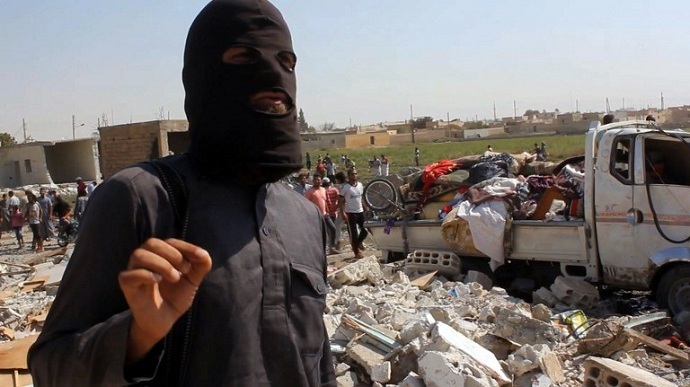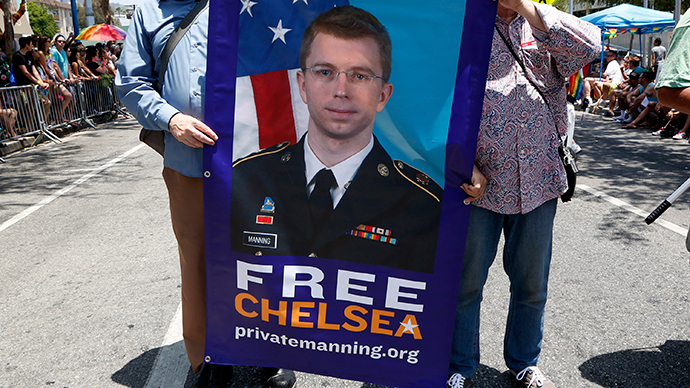WikiLeaks source Chelsea Manning believes military action won’t destroy the Islamic State, and thinks that the United States and its allies should attempt to disrupt the militants into self-destruction through containment.
“Based on my experience as an all-source analyst in Iraq during the organization’s relative infancy, ISIS cannot be defeated by bombs and bullets,” Private Manning, 26, wrote in an editorial published Tuesday in The Guardian.
“I believe that ISIS is fueled precisely by the operational and tactical successes of European and American military force that would be – and have been – used to defeat them,” she wrote. “I believe that Isis strategically feeds off the mistakes and vulnerabilities of the very democratic western states they decry. The Islamic State’s center of gravity is, in many ways, the United States, the United Kingdom and those aligned with them in the region.”
Islamic State account has a released a map of territory their claim to control across #Iraq-#Syria: pic.twitter.com/DeAbyLeBrX
— Charles Lister (@Charles_Lister) August 18, 2014
Manning focused on four arenas to disrupt the growth of the ISIS militants, known for their cruelty and violent adherence to Muslim laws. The four major steps she listed include: “Counter the narrative in online ISIS recruitment videos” to prevent the recruitment of western fighters, set publicly announced borders in the region, establish an international moratorium on paying hostage ransoms and prevent the group from stealing historical artifacts and other treasures that they are currently using as funding sources.
The biggest focus, Manning believes, should be allowing the Islamic State to fail as its own country. “Let ISIS succeed in setting up a failed ‘state’ – in a contained area and over a long enough period of time to prove itself unpopular and unable to govern. This might begin to discredit the leadership and ideology of Isis for good,” she wrote.

The op-ed comes as the United States, along with several allies, are preparing to expand airstrikes from Iraq into Syria. US Defense Secretary Chuck Hagel said Tuesday that US Central Command has a plan to take “targeted actions against ISIS safe havens in Syria,” including striking infrastructure. Hagel also unveiled a plan to boost Iraqi forces with 1,600 US "military advisers."
But Manning, who is currently serving a 35-year prison sentence in Fort Leavenworth, Kansas for leaking a trove of sensitive files to anti-secrecy site WikiLeaks, believes the United States' proposed action plays squarely into the strategy of ISIS leaders.
“When it comes to regional insurgency with global implications, ISIS leaders are canny strategists. It’s clear to me that they have a solid and complete understanding of the strengths and, more importantly, the weaknesses of the west,” the US Army soldier who worked as an intelligence analyst in Iraq cautioned.
“They know how we tick in America and Europe – and they know what pushes us toward intervention and overreach. This understanding is particularly clear considering the Islamic State’s astonishing success in recruiting numbers of Americans, Britons, Belgians, Danes and other Europeans in their call to arms,” she added.
Manning, who served in Iraq as Pfc. Bradley Manning, was an intelligence analyst during the US occupation of that country. She was stationed near Baghdad, Iraq in 2009 when she saw the reality of these wars and decided to speak out.
“I believe that if the general public… had access to the information… this could spark a domestic debate as to the role of the military and foreign policy in general,” Manning said during her trial in March 2013, speaking from a 35-page prepared statement that admitted her guilt.
Manning hoped releasing intelligence on the Iraq and Afghanistan Wars to WikiLeaks would “spark a domestic debate on the role of our military and foreign policy in general.”
Now the former intelligence analyst is “[p]resenting a radical alternative blueprint for how to deal with the extremist group,” The Guardian wrote in a companion analysis to the op-ed. Manning argued that containment the best way to take down the Islamic militants now controlling parts of Iraq and Syria, adding that “the world just needs to be disciplined enough to let the Isis fire die out on its own, intervening carefully and avoiding the cyclic trap of ‘mission creep’.”
“This is certainly a lot to ask for. But ISIS is wielding a sharp, heavy and very deadly double-edged sword. Now just wait for them to fall on it,” Manning concluded.

